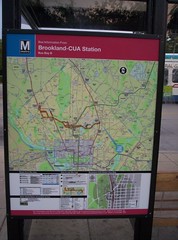Transit travel (and marketing) as a lifestyle

Gee writes (and I appreciate his writing to goad some content forward, given my illing ways lately), slightly edited with my comments inserted:
I am not rich, I don't like driving my car.. but I have no option but to drive the car due to my hours and the costly commute option ($11 per day for me with about 1 and 1/2 hours commute on train one way). My spouse lives close to work but I am far away (we adjusted with one) - so what are my options?
[I would argue it's too expensive for public transit to serve you cost-effectively, probably]
Everyday we keep hearing stories about the DC metro - how it's breaking down, how it does not make any money etc etc ... looking at its policy it no surpirse that it has these problems. Why don't they hire someone from any of the European countries and get the right policies?
Make people want to use metro any time of the day and decrease traffic congestions by continously improving existing lines and adding more lines.
[Yep. And start eliminating free parking at work, at school, at shopping malls]
Want to increase revenues ..here are some simple suggestions that would make our lives easier too:
1) have small grocery shops or small shops like at the gas stations where one can get basic stuff - people using the metro would really use it regularly to buy some of the small things that they may need while going to back home or even to the office (eg milk eggs, even flowers). The metro can earn revenues by subletting their space.

Tom Toles editorial cartoon for the Washington Post.
[Systems like the Hong Kong transit system make 1/2 their annual revenue from lease payments/realty.]
2) Have small coffee / breakfast shops for the morning commuters who regularly use the metro in the stations - and the metro can earn revenues by subletting their space.
[While I don't think the volumes exist at many stations to make this work, who's to say we shouldn't be working to make transit stops much more friendly and convivial places? Why not try to put places like this at various stations.]
3) During non rush hours or weekends or holidays - have easy to use all day family tickets. If I have to buy a seperate tickets for each member of a four member family ( or more if I have guests one weekend and want to use the metro) - and for each place i go to - It is not economical to use the metro. I would rather drive, add to the pollution, the traffic problems... etc etc. But if the Metro offers an all day pass for up to 4 people for $10 - what a great deal. Why will I take out my car, spend the money on Gas, try to find parking or risk getting stuck in traffic when I can use the metro, get some exercise and quality time with the family.
[This also is relevant to transit for people attending athletic events like baseball. An all-family pass for such an event is something to consider.]
4) Have monthly passes for regular Metro users. Washington DC is the only metro systrem I know that fines it regular users with highest ticket prices and no monthly discount for regular users. What a stupid idea to fine your regular users? If I use the metro to go to office (and so contribute to one less car on the road.) I have to go during the rush hour time - their is no way out unless each and every company has flex time.
[I made the point last week that the WMATA system actually charges based on real costs, which economists would say is a good thing. Still there is a way to balance the real costs with the need to promote mode shift, after all we don't want to coax people back into their cars because seemingly it is cheaper to drive than to take transit.]

Become a part and parcel of the commuters' lives instead of a stand alone system and that is how you make money. There are enough examples in this country of how products become successful - take some lessons from corporate America.
I would welcome the comments / suggestions of the readers.
Labels: neighborhood-based transportation planning, transit marketing, transportation demand management, transportation planning



0 Comments:
Post a Comment
<< Home